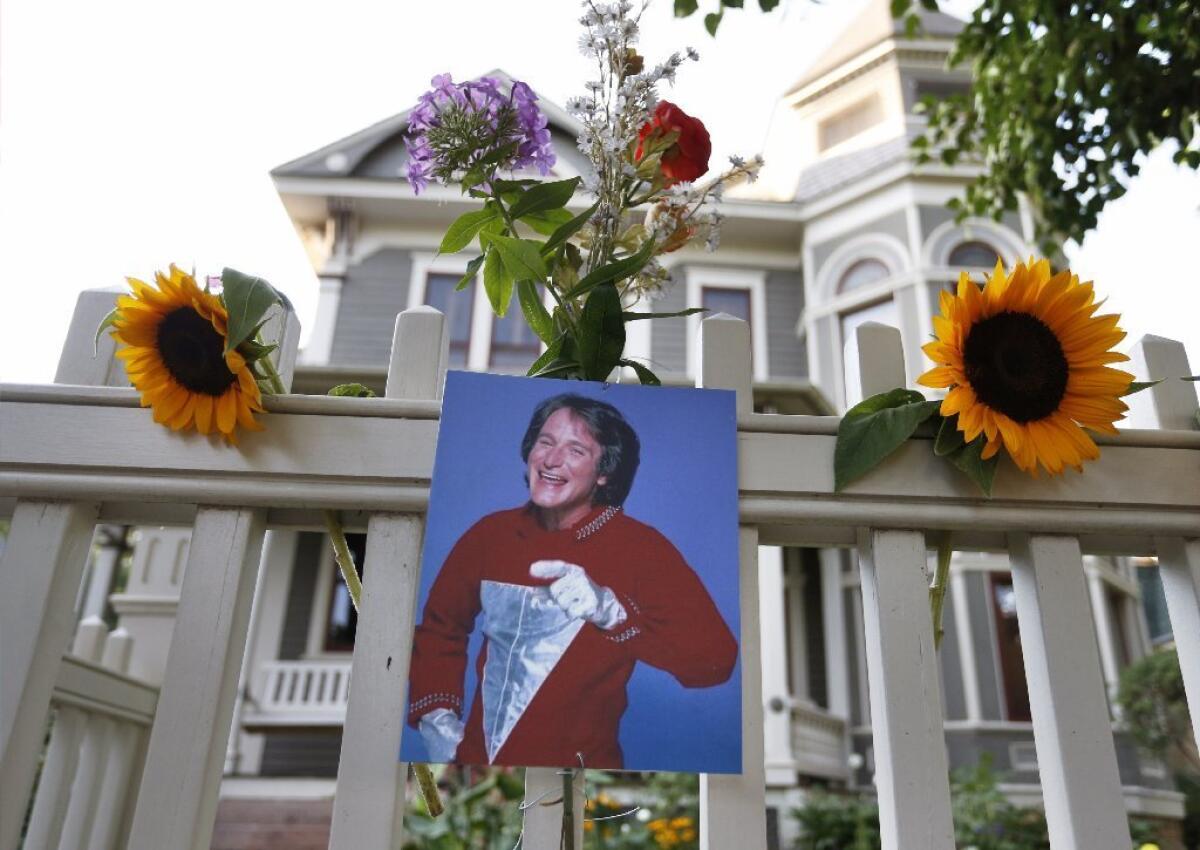Column: Robin Williams: A Mork in the family

- Share via
As sitcoms of its era went, “Mork & Mindy” was neither the best nor the worst. It may, however, have been among the sneakiest in its social commentary. A “Happy Days” spinoff that ran from 1978 to 1982, its premise was that Mork, an alien from the planet Ork, played by Robin Williams, is sent to far more-primitive Earth to report back on the customs of its people. Upon landing in Boulder, Colo., in a giant flying egg, Mork tries to assimilate by wearing a man’s three-piece suit but puts it on backward, allowing girl-next-door Mindy to mistake him for a priest. Once installed in her apartment, Mork sheds the suit for his trademark rainbow suspenders and eventually establishes himself in the community as a lovable if perpetually confusing — and confused — visitor from a strange land.
It’s hard to look at those rainbow suspenders now and not think of rainbow iconography like the gay pride flag. And though it’s likely that Mork’s sartorial choices reflected the lingering hippie-influenced rainbow craze (remember the ubiquitous translucent rainbow stickers?) rather than solidarity with gay liberation, there’s something strangely prescient about them as a signifier of outsider status. Moreover, watching Mork again makes you wonder if that puffy-haired, whirling dervish of an alien was, if not Williams’ greatest role, ultimately his most personal one.
Monday’s news that Williams had died from an apparent suicide has stirred up discussion about depression in general and what we now know were Williams’ lifelong struggles in particular. Though his early problems with alcohol and cocaine were acknowledged, Williams never spoke publicly about battling mental illness, and one narrative emerging from the teeming piles of psycho-cultural analysis is that Williams’ depression hid in plain sight. As an actor and a comic, his emotional pendulum swung in a wide arc between manic ebullience and almost Zen-like sincerity. And the ease with which he occupied both realms, the facility he brought to the hysterical slapstick of “Mrs. Doubtfire” and the somber earnestness of roles like the psychologist Sean Maguire in “Good Will Hunting,” must surely be a kind of bipolar magic.
A lot of comedians are sad clowns, laughing on the outside while being devoured on the inside by insecurity and self-destructive impulses. And it’s easy right now to think of Williams as the saddest clown of all. But to watch old episodes of “Mork & Mindy” this week (which I and, according to YouTube viewing numbers, quite a few other people did) is to realize that Williams’ mien wasn’t defined by a sense of sadness as much by a sense of otherness.
As Mork, Williams was literally an extraterrestrial, but he was an alien in other ways too. Neither man nor boy, he has no parents, no relatives and ostensibly no emotions. His manner of speech is flat and robotic. In the pilot, Mindy explains that his voice is “not right” and coaching him on how to talk like an earthling. For all his vitality, he doesn’t exude much sexual energy (though he has an erogenous spot on his wrist), and it’s telling that the show’s ratings went down in later seasons when the producers made the two a romantic pair rather than just roommates. By the time they had a baby, who arrives via Mork’s navel and turns out to be an elderly man played by Jonathan Winters (because Orkins age in reverse), the show was on its last legs and Williams was poised for intergalactic stardom in the movies.
Mork was the ur-foreigner. An immigrant, an orphan, an Asperger’s case, a parent by nontraditional means and a sexual outlier, his rainbow suspenders hold up not just his pants but also a whole constellation of nonconforming traits. And Williams, no matter how much a Hollywood insider he was, in many ways always played a foreigner. Even in his most sentimental turns (paging Dr. Patch Adams!) his face registered the wonder and bewilderment of a traveler stepping onto a new land. He was an all-American boy who grew up in Michigan, the son of an auto executive, affluent and carefully tended, but in his soul he was an alien. For a legion of fans, he felt almost like family.
Twitter: @meghan_daum
More to Read
A cure for the common opinion
Get thought-provoking perspectives with our weekly newsletter.
You may occasionally receive promotional content from the Los Angeles Times.











